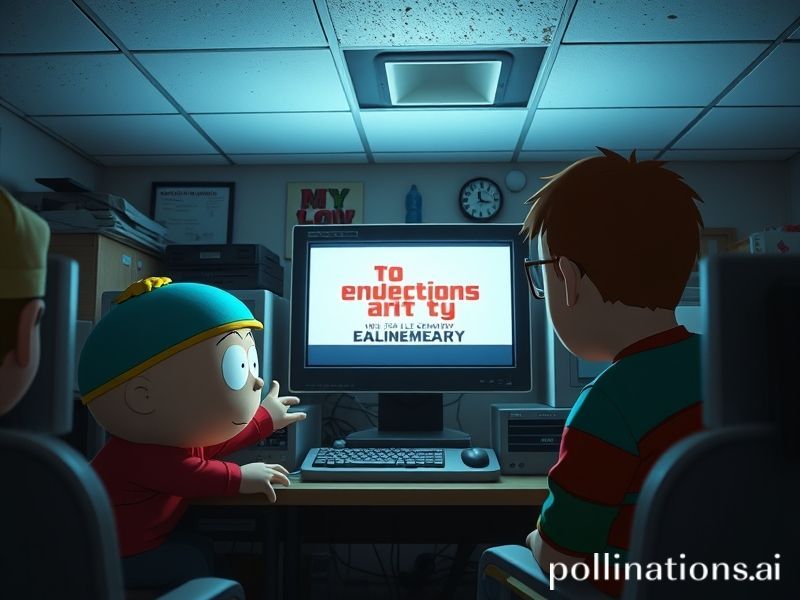South Park’s New Episodes Ignite Worldwide Outrage Festival—Passport, VPN, and Marshmallows Required
South Park’s Return: A Diplomatic Incident in Four Acts and a Streaming War
By L. V. Mercier, Senior Correspondent, Dave’s Locker International Desk
The new batch of South Park episodes that dropped last week did not merely land on Paramount+; they crash-landed, parachute-first, into a planet already teetering on its axis. From Lagos living rooms to Seoul subway commuters pirating the show off Telegram, the familiar cut-out animation has once again become a sort of rogue state—issuing passports to bad taste, sanctions on sacred cows, and export-grade embarrassment for every government that thought it had the monopoly on satire.
Act I: The Global Supply Chain of Offense
In Bogotá, a local senator tweeted that Cartman’s new crypto-bro arc was “blatant gringo stereotyping” before his aide reminded him Cartman is, canonically, American. Meanwhile, Berlin’s Tagesspiegel ran a think-piece arguing the show’s depiction of the German energy crisis was “structurally xenophobic”—a phrase that, translated back into South Park English, roughly means “We’re still not over that Volkswagen joke.” The beauty of South Park, of course, is that it treats every culture like a piñata: swing hard enough and something sweet and sticky comes out, usually national dignity.
Act II: Streaming Geopolitics 101
Paramount+’s staggered release schedule—episodes debut in the U.S. 48 hours before they appear elsewhere—has turned VPN usage into the newest form of soft power. Canada, ever polite, waited. Brazil did not. The result: a thriving black-market subtitle economy where phrases like “screw you guys, I’m going home” mutate into “vai se ferrar, gente, tô indo pra casa,” which, linguists note, somehow sounds more hurt in Portuguese. Analysts at the OECD, presumably between coffee breaks on how to tax the air we breathe, estimate that illicit South Park traffic costs rights holders roughly $17 million per season—roughly the price of a single F-35 bolt.
Act III: The Currency of Outrage
Every region has its bespoke grievance. India’s Information Ministry issued a “please clarify” letter over a throwaway line about outsourced customer support, proving that the world’s largest democracy still keeps a Victorian fainting couch on standby. France, meanwhile, embraced the ribbing with existential shrug: “At least we’re not Belgium.” The episode skewering the British monarchy aired hours after Charles unveiled a new national portrait; royal aides reportedly watched through lorgnettes of pure disdain, then leaked that the corgis found it “beneath them,” which is saying something for animals that lick their own privates.
Act IV: The Algorithmic Afterlife
Within 36 hours, the season’s catchphrases had already been weaponized by every ideological drone on the planet. Chinese state media spliced a Randy Marsh rant into a TikTok about American decadence; American state media spliced the same clip into a TikTok about Chinese censorship. Somewhere in a windowless room, an AI is auto-generating 47,000 think-pieces titled “South Park and the Crisis of Late-Stage Capitalism,” each one indistinguishable from the last, like snowflakes in a blast furnace.
Epilogue: A Toast at the End of the World
Back in Colorado, Trey Parker and Matt Stone have reportedly purchased yet another restaurant that no one asked for—this one themed around NFTs, because irony is the only asset still appreciating. They claim the new season is “just jokes,” a statement so transparently false it could run for office. The rest of us, clutching whatever national flag or streaming password we call home, queue up for the next episode like refugees seeking asylum in 22 minutes of badly animated catharsis.
Because if the planet is indeed sliding into a geo-political dumpster fire, at least South Park remembered to bring the marshmallows. And, as any good international correspondent will tell you, nothing unites humanity quite like gathering around the flames to watch someone else get roasted first.







